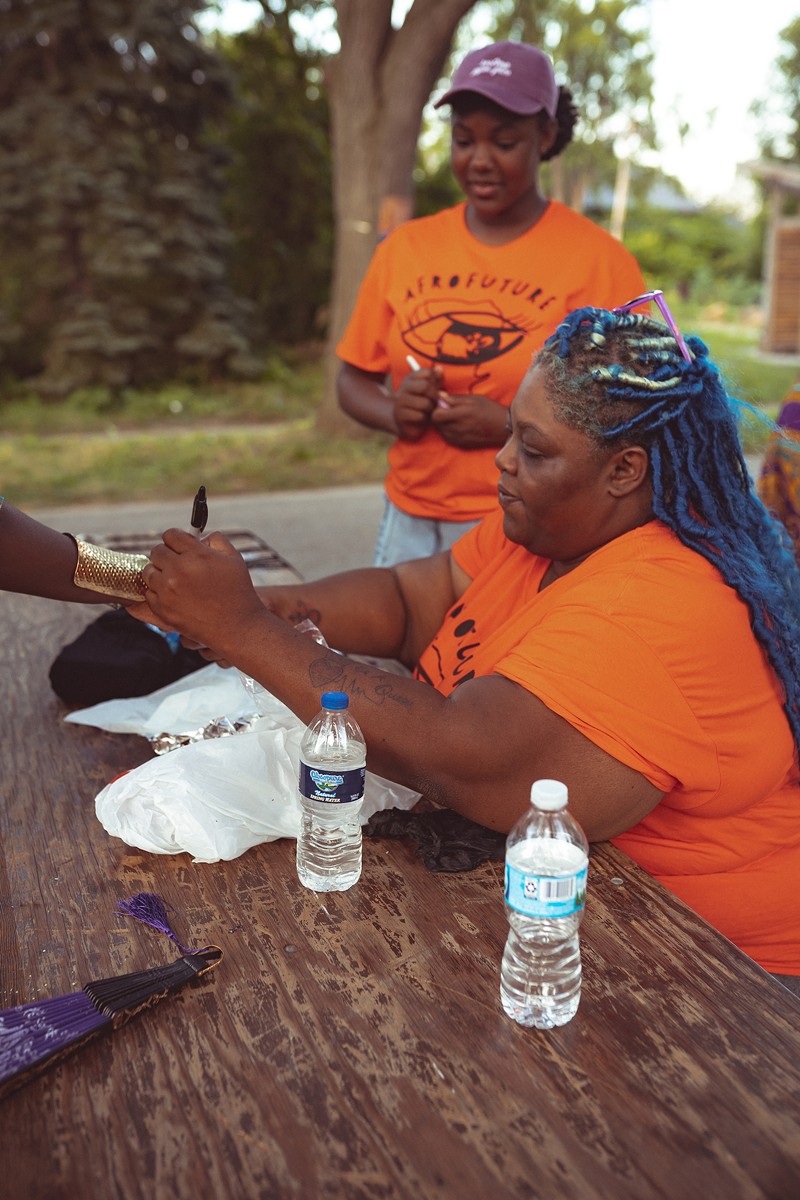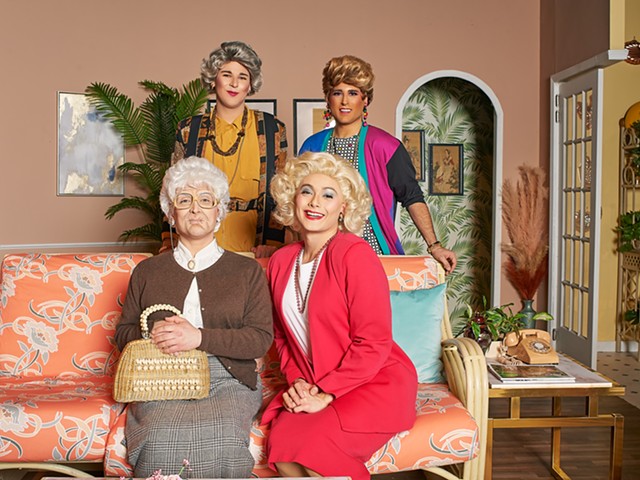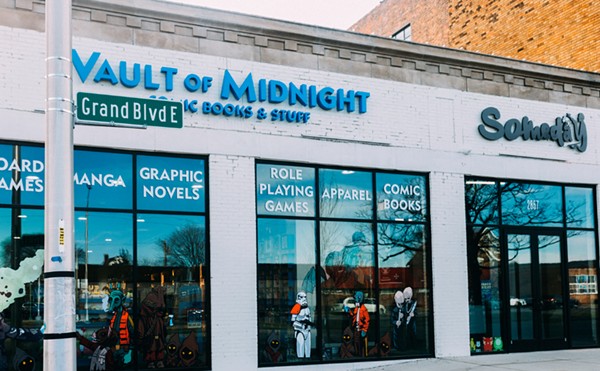
What does a sustainable and equitable future look like for people of color? It looks like communities coming together to grow their own food, share labor, and educate their children outside the frame of capitalism.
That’s according to the organizers of Detroit’s Afrofuture Fest. After a four-year hiatus, the community building festival will return to the Feedom Freedom Growers farm on Sunday, Aug. 6 with a series of workshops, live music, wellness practices, food, and a coinciding art exhibit on communal sufficiency.
“I think of communal sufficiency as an exit plan out of this system,” says Adrienne Ayers, who is organizing the festival alongside the Feedom Freedom Growers. “It’s about the many ways we can come together and strategically organize and share labor, and efforts to meet our material needs, meaning food, housing, water, energy sources, education, clothing, time, safety, transportation, and energetic wellness, but specifically in right relationship with the earth. It’s informed by political education, ideological development, and communal practices of our ancestors.”
With communities of color facing food insecurity and the ongoing climate crisis plaguing us all, Ayers says it’s time to start thinking of ways to build an alternative way of life that doesn’t exploit people or the earth.
She adds, “That takes time. I don’t expect anybody to just be able to pull out right away but I think people should start to ask themselves, who are my neighbors… and how can we start to slowly but surely build out what we need over time and be OK? And also ask yourself, why do you work? At the end of the day, it’s about the fact that you need money right now to live. What if you took that same time and grew together and shared the labor with your comrades and your neighbors?”
The art exhibit that corresponds with the festival, Communal Design, Collective Futures, will show examples of ways to build sustainable housing like mud houses, and food systems like rain gardens. It opens at Highland Park’s 333 Midland gallery on Friday, Aug. 4 and will remain on display the entire month.
“We show different examples in every area as it relates to material and holistic needs, food, water, transportation, shelter, education, energetic wellness, and how can we design the things that we need to survive together by sharing labor to build anti-capitalist communities,” Ayers explains. “At the exhibition, you get to see these things that build hope and spark inspiration that this is possible. Then at the festival, you get to step into the actualization of it.”
Activities for the festival include topics like mushrooms for womb healing, a rain garden workshop, an introduction to cooperative models, collective yoga, sound bowl meditation workshops, food demonstrations, and a reiki station with Heal in the Waters Wellness students.
Monique Thompson, programming director at Feedom Freedom’s Kulture House, says the festival focuses so heavily on cooperative economics because sustainability is difficult to accomplish alone.
“We’re linking arms to overcome,” she says. “Sometimes it’s gonna take folks trying to do it by themselves to recognize that you have to build in-community. It’s like the cells in our body. The cells come together to form a larger system.”
Workshops and interactive activities will take place across the Feedom Freedom Growers Farm at 866 Manistique and the nearby Kulture Hub at 291 Manistique.
The music lineup for the festival features Milfie, DJ AK, Sophiyah E., DJ Blackmoonchild, Srch Engn, DJ Etta, and DJ Sabetyee, with more artists to be announced later.
Several community organizations will also be onsite to provide information and support for people who want to build a sustainable community like Keep Growing Detroit, Motor City Mobile Wellness, Detroit Disability Power, the Joy Project, Black Lives Matter Detroit, Urban Forest School, and more.
There will also be film screenings and tours of the Feedom Freedom Growers farm. Food will be provided by Sisters on a Roll Food Truck and Indigo Culinary.
The first Afrofuture Fest in 2019 was mired in controversy over a ticket system that initially charged white people more than Black people. After word of the controversy garnered national attention, Ayers says she and the Feedom Freedom Growers were hounded with death threats and online abuse.
Somewhere in the sea of negative publicity and outrage from folks who didn’t understand the concept of social equity, the fact that the festival was originally meant to support Ayers’ Afrofuture Youth organization for Detroit children, was lost.
“The amount of harm that I endured, the amount of harm that was sent towards my elders, my youth, and organizers of the festival, caused me to have PTSD and need a break,” Ayers says. “So I focused four years solely on my babies. All we’ve done has been programming focusing on political education, wellness, organizing, and just giving them all my attention.”
This festival marks the dissolution of Afrofuture Youth as Ayers combines her programming with the Feedom Freedom Growers which funds from the festival will benefit this year.
This time, the festival is using a sliding scale ticketing model based on need and the festival goers’ direct experience with racism and discrimination. There are three tiers that ask the attendees whether their basic needs of housing, food, and transportation are consistently met. It’s based on the honor system, as there’s no real way to know who pays what, so Ayers hopes that people answer honestly.
The community access tier is $15 and is for people who are impacted by systemic racism or discrimination based on gender or sexual orientation.
The standard ticket price is $30 and is for people who can say “my basic needs are consistently met.” The last option is $45 for people who answer, “My basic needs of food, housing, transportation are of no concern. I have an abundance of material wealth [and] I desire to support community work that helps to dismantle systemic racism, capitalism, and build sustainable solutions for our shared future.”
There are also scholarships available for people who fall in the community access category but still are unable to afford a ticket.
“We want people to come learn, to hopefully be inspired to understand the importance of political education and ideological development,” Ayers says. “If you care about making an impact in your community, we do believe it is your responsibility, and it is a collective responsibility to be politically educated… so you are not replicating the issues in the systems imperialism and capitalism and patriarchy.”
More information is available via Eventnoire.
Subscribe to Metro Times newsletters.
Follow us: Google News | NewsBreak | Reddit | Instagram | Facebook | Twitter






